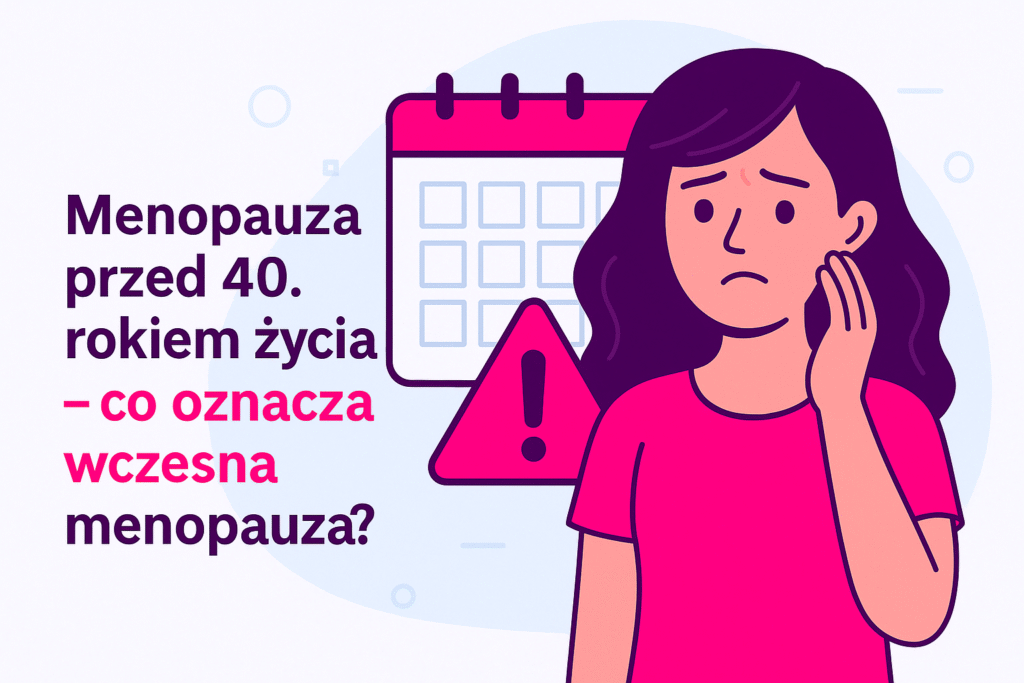Menopause is usually associated with women around the age of 50. However, around 1 in 100 women develop menopause before the age of 40, or even earlier. Such a condition is called premature ovarian insufficiency (POI). Although surprising and often shocking, it is not uncommon. In this article, we explain what early menopause means, its causes, symptoms and how to cope with its effects – health, hormonal and emotional.
What is early menopause?
Early menopause is the permanent cessation of menstruation and the end of ovarian hormonal function before the age of 40.
It is divided into two concepts:
- Premature extinction of ovarian function (POI) – process may be reversible, ovaries function irregularly
- Early menopause – permanent cessation of ovarian function
To confirm the diagnosis, perform:
- FSH level test (usually > 40 IU/l with 2 measurements a few weeks apart)
- oestradiol (low)
- AMH (low or undetectable)
- Transvaginal ultrasound – often shows absence of antral follicles
Symptoms of early menopause
Symptoms are similar to those of natural menopause, but occur much earlier and often more abruptly:
- irregular or absent periods
- hot flashes, night sweats
- vaginal dryness, decrease in libido
- mood swings, irritability, depression
- insomnia, fatigue, difficulty concentrating
- reduced fertility or infertility⁽¹⁾
Causes of menopause before the age of 40
In many women the cause remains unknown (idiopathic), but possible factors are:
- genetic factors – e.g. Turner syndrome, FMR1 mutations (fragile X syndrome)
- autoimmune diseases – e.g. Hashimoto’s, Addison’s disease
- chemotherapy and radiotherapy – toxic effects on the ovaries
- surgery to remove ovaries (e.g. in endometriosis, tumours)
- viral infections – e.g. mumps (very rare)
- environmental factors – e.g. tobacco smoke, pesticides
- severe stress, malnutrition, intensive training – can disrupt the pituitary-ovarian axis
Health implications
Early menopause is not just the end of menstruation – it is an estrogen deficiency that has long-term effects on the body:
- increased risk of osteoporosis and fractures
- increased risk of cardiovascular disease
- reduced skin density, decreased libido and vaginal dryness
- memory, mood and sleep problems
- possible difficulty in getting pregnant or infertility⁽²⁾
Is it possible to get pregnant?
Approximately 5-10% of women with POI still experience sporadic ovulation. Therefore:
- pregnancy is possible but difficult to predict
- many women opt for infertility treatment (ovarian stimulation, in vitro fertilisation, egg donation)
- women not planning pregnancy should continue to use contraception until menopause is confirmed
Treatment – what can be done?
1. Hormone replacement therapy (HTZ)
Primary form of POI treatment. The aim is not just to relieve symptoms, but:
- protection of bones against osteoporosis
- reducing the risk of heart disease and premature death
- maintenance of skin, brain and vaginal health
HTZ should be continued until the natural age of menopause (approximately 51 years), unless there are contraindications⁽³⁾.
2. psychological and emotional support
The diagnosis of early menopause is often a shock, sadness, a sense of loss (of fertility, of youth).
Worth considering:
- individual psychotherapy
- support groups for women with POI
- education and conversation with your partner
3. Supplementation and lifestyle
- calcium, vitamin D, omega-3 fatty acids
- regular physical activity (strength and aerobic)
- avoidance of smoking and excessive alcohol
- a diet rich in phytoestrogens (e.g. soya, linseed)
Early menopause – how to live with it?
Although early menopause is a difficult experience, it does not mean the end of femininity or a lifetime of health. With modern diagnosis, appropriate hormone treatment and lifestyle, you can:
- maintain a good quality of life
- prevent the health effects of oestrogen deficiency
- find new meaning and balance
- plan motherhood with the help of medicine, if necessary
Summary
Menopause before the age of 40 is a complex medical and emotional problem. It requires early recognition, specialised care and support. The key to living well with POI is awareness, hormone treatment, physical activity and mental health care. Early menopause is not the end, but a new beginning – different from what you planned, but still full of possibilities.
Footnotes
- Nelson LM. Primary ovarian insufficiency. N Engl J Med. 2009.
- Webber L et al. European Society of Human Reproduction and Embryology (ESHRE) guideline: management of women with premature ovarian insufficiency. Hum Reprod. 2016.
- Golezar S et al. Hormone replacement therapy in young women with primary ovarian insufficiency: a systematic review. Climacteric. 2020.

